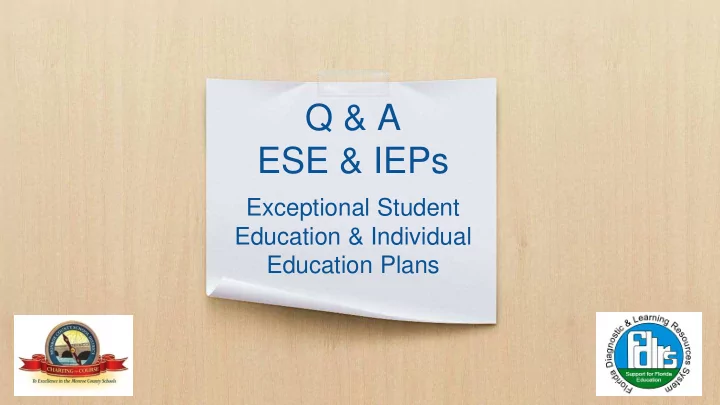

Q & A ESE & IEPs Exceptional Student Education & Individual Education Plans
Q & A ✗ Eligibility Basics ✗ Key Components of IEPs ✗ Student Supports ✗ Graduation ✗ Deferral of Diploma 2
Eligibility Basics
“If a child cannot learn in the way we teach…we must teach in the way the child can learn.” - Ivar Lovaas, world-renowned autism expert 4
Who is Eligible? Identified Disability w/ Educational Impact A child aged 3-22 has been identified to have a disability AND the disability has a direct impact on the student’s academic success that requires specialized instruction. IEP Team Decision ✗ Autism Spectrum Disorder ✗ Other Health Impairment ✗ Deaf or Hard-of-Hearing ✗ Orthopedic Impairment ✗ Developmentally Delayed ✗ Specific Learning Disability ✗ Emotional/Behavioral Disability ✗ Speech Impairment ✗ Intellectual Disability ✗ Traumatic Brain Injury ✗ Language Impairment ✗ Visual Impairment 5
Key Components of Individual Education Plans (IEPs)
IEPs Include ✗ Student Information – demographics ✗ Special Considerations – specific areas that affect eligibility ✗ Graduation – standard diploma for all ✗ Domains – areas of support that will be addressed in the goals ✗ General Factors and Assessment Data – health concerns and results of psychoeducational evaluations ✗ Present Level of Performance/Strengths – academic and/or behavioral strengths and areas for growth 7
IEPs Include ✗ Transition – post-secondary education, employment, career, and independent functioning ✗ Academic or Behavioral Goals – specific and measurable ✗ Assessment – FSA or FSAA ✗ Assessment Accommodations – allowed and mirrored in the classroom ✗ Special Education Services – therapies or other related services ✗ Classroom Accommodations – may provide more support than assessment accommodations ✗ Least Restrictive Environment – time spent with nondisabled peers 8
Student Supports – Accommodations
Presentation Accommodations ✗ Listen to audio recordings instead of reading text ✗ Have another student share class notes Be given an outline of a lesson ✗ Use visual presentations of verbal material, such as word webs and visual organizers ✗ Be given a written list of instructions
Response Accommodations ✗ Give responses in a form (oral or written) that’s easier ✗ Dictate answers to a scribe ✗ Capture responses on an audio recorder ✗ Use an electronic spell-checker ✗ Use a word processor to type notes or give responses in class ✗ Use a calculator or table of “math facts”
Setting Accommodations ✗ Work or take a test in a different setting, such as a quiet room with few distractions ✗ Sit where he learns best ✗ Use special lighting or acoustics ✗ Use sensory tools such as an exercise band that can be looped around a chair’s legs (so fidgety kids can kick it and quietly get their energy out)
Timing and Scheduling Accommodations ✗ Take more time to complete a task, test or project ✗ Have extra time to process oral information and directions ✗ Take frequent breaks, such as after completing a task ✗ Take a test in several timed sessions or over several days ✗ Take sections of a test in a different order ✗ Take a test at a specific time of day
Graduation
Graduation Requirements All students, including ESE, have the same graduation options ✗ 24 Credit Option ✗ 18 Credit Option ✗ Merit ✗ Scholar ✗ FLDOE Graduation Requirements
Graduation Requirements Two options are available only to students with disabilities. Both require the 24 credits ✗ Students with significant cognitive disabilities may earn credits via access courses and be assessed via an alternate assessment. ✗ Students who choose the academic and employment option must earn at least .5 credit via paid employment.
Deferral of Diploma
Who Can Defer? Student enrolled in A accelerated college credit instruction, IEP requires special industry certification education, transition courses that lead to N planning, transition college credit, services or related collegiate high services to age 22 school, “scholar” D courses, or structured work study/ internship.
Deferral Notes ✗ State must be notified of intention to defer prior to May 15 th of the year graduation requirements are met. ✗ The diploma date will reflect when all graduation requirements are met. ✗ Student may request their diploma at any time up to reaching the age of 22. 19
Questions? Contact Linda Diaz Linda.Diaz@KeysSchools.com Monroe County School District Secondary Transition Specialist FDLRS-South Parent Liaison
Recommend
More recommend